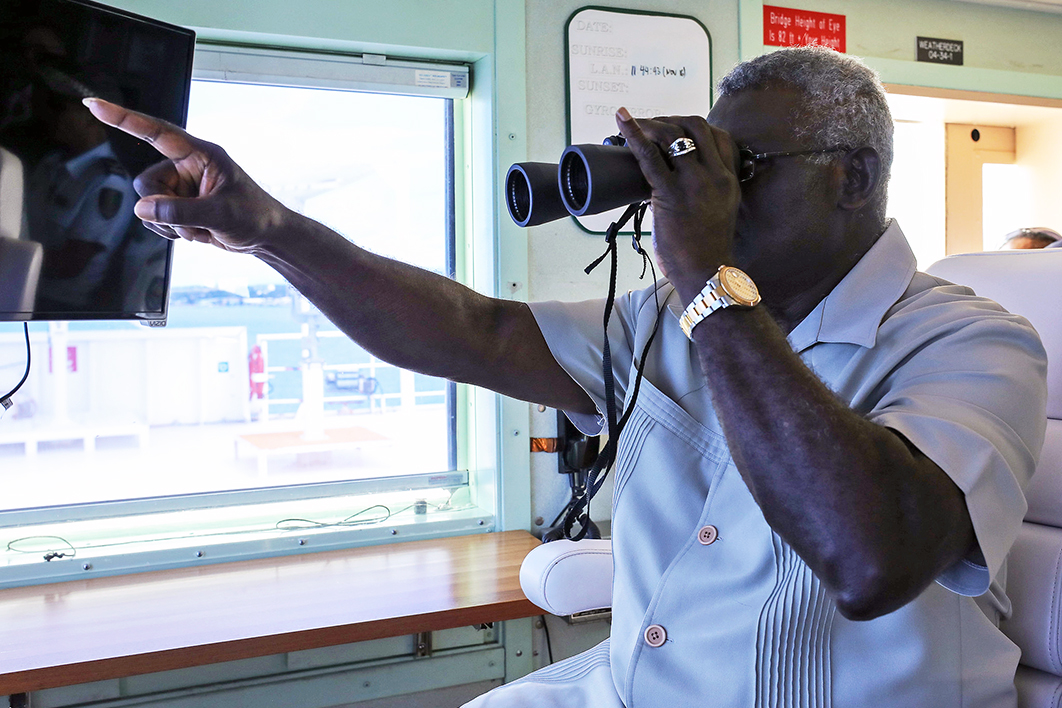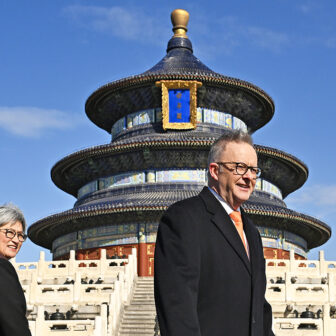With the rains of the cyclone season holding, it had turned into a glorious evening. Strapping young men dressed, minimally, as traditional warriors and young women more demurely outfitted as village maidens led teams from twenty-four Pacific nations and territories into the centre of a brand new stadium.
From the stand, Manasseh Sogavare, the Solomon Islands prime minister, looked on with relief and satisfaction. “Sports is the glue that holds the nation together,” he had told local reporters earlier. “It binds and unites us. It brings out the best of us, as individuals and collectively as a nation.” Regardless of “misinformation and shallow opinions” about the Pacific Games, “especially by a few foreign media,” Solomon Islands was united and proudly telling its games story to the world.
The games, which kicked off at that ceremony last Sunday night, have lifted the mood here after three years of turmoil and hardship. A dispute in November 2019 over Sogavare’s switch of diplomatic recognition from Taipei to Beijing led to ethnic-influenced rioting that trashed Honiara’s old Chinatown — the unrest ended, Sogavare’s government saved, by Australian troops and police flown in from Townsville. Then came Covid-19 and two years of isolation that shrank the economy by around 5 per cent.
Economic growth returned this year, but the mood was still gloomy. Along with the daily struggle for their livelihoods, people were mostly concerned about how their home provinces were doing, rather than the Solomons more widely, says veteran Honiara journalist Dorothy Wickham. “The only time you see Solomon Islanders proud of their own country is when there are things like this,” she says, referring to the games.
“I think that was one of the reasons the government wanted to go ahead,” Wickham adds. “They felt this country needed a unifying event. Even though it has come at a big cost, it was needed at this time. Especially after we’ve come through the ethnic crisis and people are fragmented.”
The cost of building facilities and hosting 5000 athletes is a big one for a country of 720,000 people with a per capita GDP of about A$3500, its deficit in trade and government spending covered largely by foreign aid and growing remittance flows from the 7000 seasonal workers now in Australia and New Zealand.
But the games have also became the focus of another competition that Solomon Islanders sum up in one word: geopolitics. China spent around A$120 million building playing courts, pools and the main stadium. While some feared that Honiara would be left with facilities unduly expensive to use and maintain, the stadium is far from grandiose — more like a typical Australian sporting club’s home ground than a grand final venue. New or improved halls of residence for visiting athletes are attached to seven colleges and schools around the city and will be a legacy for Solomon Islands students.
In the lead-up to the games, Chinese chargé d’affaires Ding Yonghua was dispatching influential Solomon Islanders off for tours of his country: all the provincial premiers for two weeks in October, a group of journalists for nine days in November. Two ambulances and four dental chairs arrived from a city in Guangzhou that has old trading links with the South Seas. In mid November, a squad of Chinese police installed metal detectors and video cameras at the games venues. Though only about fifteen-strong, their presence led to some overheated reports of Chinese police “patrolling” the city.
Big projects are being rolled out by Chinese contractors. One has just completed a new terminal and tarmac resurfacing at the airport in Munda, a tourism hub in the country’s west, which will enable direct Airbus flights from Brisbane. Huawei, the much-suspected Chinese telecommunications giant, will build 161 new mobile telephone towers funded by a A$96 million soft loan.
Not to be outdone, Australian high commissioner Rod Hilton has been in diplomatic overdrive, dispensing A$17 million in games assistance, including teams of sports medicine specialists. Together with Sogavare, he flew to Taro, the main town in the prime minister’s home province of Choiseul, to mark completion of the local airport’s hard surfacing and night-landing lights.
The Australian navy’s amphibious ship Choules arrived in early November to deliver two 4WD ambulances, vast numbers of uniforms and much other paraphernalia for the games, along with rolls of newsprint to keep Honiara’s two papers on the streets. A hundred Australian Federal Police officers flew in, on top of the fifty stationed in the Solomons since the 2019 troubles. New Zealand brought in two helicopters. The day the games opened, the US navy hospital ship Mercy arrived as part of the United States’ annual Pacific Partnership exercise, its great white bulk anchored off the city.
Australia won the VIP stakes at the opening ceremony, fielding governor-general David Hurley, who also used the opportunity to open new Australian aid projects. China came up only with Cai Dafeng, an architecture professor who is a vice-chairman of its National People’s Congress and leader of the China Association for Promoting Democracy, one of the eight tiny parties allowed in the NPC alongside the Chinese Communist Party. Despite the mission implied in his party’s name, Cai figures in the US sanctions list of officials alleged responsible for subverting Hong Kong’s limited democracy.
“The switch to China? I see some benefits in it,” Wickham says. “The best thing is the Americans have come back in, and the Australians are making more effort now. They are falling over themselves.”
Sogavare has played a hard game to fight back from his troubles of four years ago. Those troubles were driven by Daniel Suidani, then premier of Malaita, the country’s most populous island and historically the one that has sent out the most ambitious people to take advantage of the modern world.
Suidani, alone of the premiers, refused to back the switch to Beijing and cultivated continuing links to Taiwan. At one point he talked of a referendum about seceding. Sogavare’s supporters in the provincial government put up three motions of no-confidence to unseat him. The first failed. Street protests in the Malaita capital Auki prevented the second from getting to a vote. Early this year, though, the third was passed. Soon after, the central government used its supervisory powers to banish him from the provincial assembly, a move Suidani is still contesting in the courts.
While it lasted, Suidani’s defiance won support from anti-China hawks in Washington and Canberra. In a perhaps ill-judged move, the US government announced a US$25 million aid program for Malaita focused on sustainable village and forestry development. Honiara insisted such aid had to come through the central government, and when the US tried to send the funds via a civil contractor posing as a non-government organisation, the central government delayed work permits for its managers and experts.
Though some of those projects are visible in Malaita, Sogavare’s relationship with the Americans is still testy. A proposal from Washington in 2019 to resume sending Peace Corps volunteers, after a twenty-five-year absence, is still awaiting approval by Sogavare’s cabinet.
Although accusations of bribery have flown thick and fast around the votes of no-confidence that kept Sogavare in office and unseated Suidani — with sums of up to A$10,000 allegedly offered to MPs to switch sides — Ronnie Jethro Butala, the speaker of the Malaita assembly, says he saw no evidence of corruption. The explanation, he tells me, was simpler: Malaitans could see they were losing out.
“A lot of the Malaita public were getting tired of geopolitics,” he says. “No more funding was coming from the national government, and also the national government diverted all the projects from Malaita to other provinces. So it came to a stage where a lot of people said, ‘Okay, we are fed up of geopolitics, politics of different countries. We want the [provincial] government to go back to joining the [national] government so they look to ways to improve Malaita, especially with the roads and infrastructure.’”
As well as lacking development funding, Malaitans were being passed over for senior positions in the central government. Officials from the island used to be strongly represented among departmental secretaries, police commissioners and heads of authorities. Under Sogavare, preference has gone to officials from the Western and Choiseul provinces, the prime minister’s home ground. “A lot of experienced Malaitans now, most have found their way back to the village,” says Butala.
Still, Malaitans were used to being singled out and resented for their pushiness. “The black sheep within the flock,” he says. The idea of withdrawing from the Solomon Islands and going it alone isn’t dead. “My private view is that when you look at the resources in Malaita, [it] can become a very rich country if we have our independence,” he says. But a huge improvement in infrastructure would be needed first.
If the Pacific Games conclude successfully, Sogavare still faces the challenge of a severely stretched government budget and looming national elections, which have been postponed six months until next April. At sixty-eight, he is in his fourth period as prime minister and said to be anxious to finish his career with big achievements in infrastructure to bind the islands together.
The son of a Seventh Day Adventist pastor, Sogavare is admired for his discipline and focus. His main problem, says Wickham, is that his parliamentary supporters have little understanding of economics. “That’s his biggest downfall: he’s surrounded by politicians who just want to get rich out of the system.”
Like elections in surrounding Melanesian countries, next year’s vote will be a contest of personalities and patronage networks. Formation of government will start only after results are declared in the country’s fifty electorates (fourteen of them in Malaita, where Suidani is forming a ticket) and MPs arrive in Honiara.
As for the geopolitics, voters will no doubt be swayed by the projects they see being built in their provinces and electorates. A good Chinese-built project would overcome the widespread antipathy this highly Christianised population feels towards China, says Wickham. “It’s like throwing a coconut into the sea — it will roll with the waves. That’s how we are reacting now.” •




